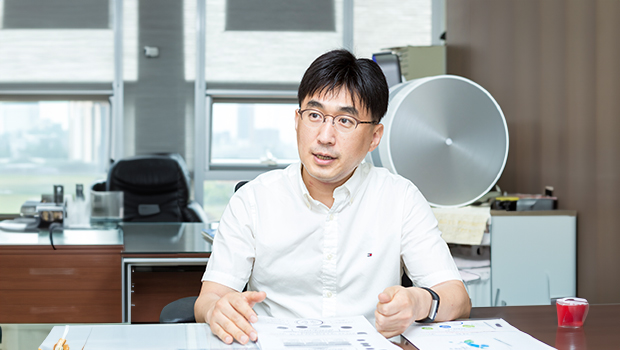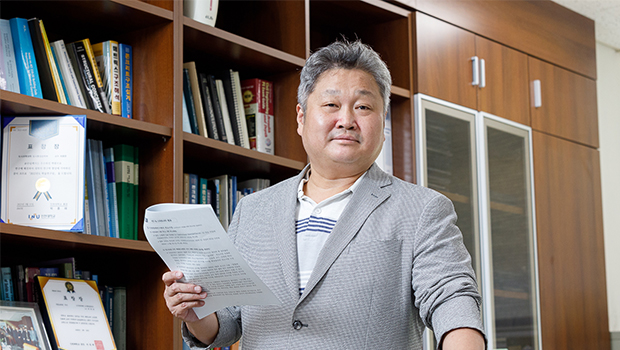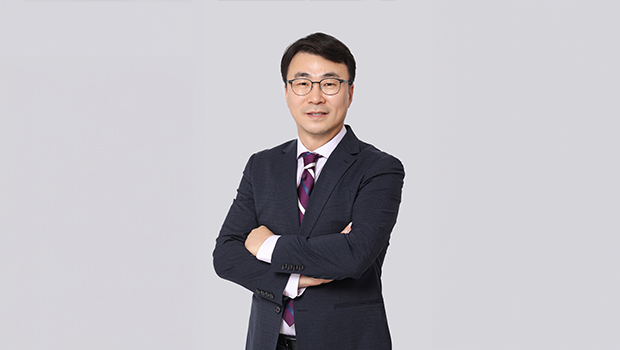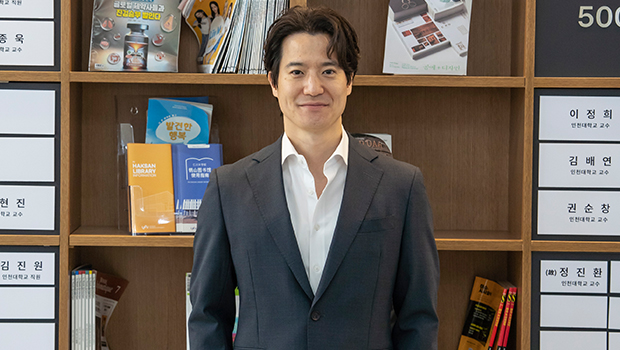A convergence group research system led by 'innovation' and four K-grade research institutes will lead it
- 글번호
- 395548
- 작성일
- 2024-10-06
- 수정일
- 2024-10-06
- 작성자
- 홍보팀 (032-835-9490)
- 조회수
- 349
Three Research Institutes Re-Selected with K-Rating Are Navigating Toward Becoming Signature Research Centers to Enhance the Value of Incheon University
Han Min-seop, Head of the Research Office: "A performance-centered research system that creates social value will become a key asset for Incheon University."
Since taking office in May 2021, Park Jong-tae, president of Incheon National University, has established and promoted a 'research-type university' as a vision. There are two pillars. They are the 'collective research system' and 'INU SURE LAB', which began in 2022 and 2023, respectively. The former is a project to develop the signature research institute of Incheon National University by fostering excellent research institutes, and the latter is a program to secure a virtuous cycle of research manpower through the research lab building. These projects are evaluated to have achieved significant results in a short period of time. In the 2023 JoongAng Ilbo University Evaluation, they ranked 21st in the overall ranking, 2nd in the number of papers in international academic journals per professor, and 9th in the national educational conditions. By conducting an in-depth analysis of the success factors and tasks of Incheon National University's research-type university vision, I would like to present a benchmarking case for the university's development strategy facing the challenges of global competition and low birth rate.
Soon after taking office, Park Jong-tae, president of Incheon National University, promoted the vision of a research-type university and placed a convergence group research system at the forefront. It was evaluated as a practical reform that accurately targets the essence of the era of the 4th industrial revolution, where the division of traditional departments becomes meaningless. "In order to develop as a research-type university, Incheon National University has established a group research system centered on excellent research institutes in 2022 to establish an environment to challenge large-scale national research projects," said Park Jong-tae, president of Incheon National University. "We will overcome this crisis through excellent research results in an era where the university's existence value is threatened due to a decrease in the school-age population and youth employment difficulties."
News Today has been reporting with interest since President Park launched the convergence group research system in 2021. In order to analyze and evaluate in what direction the group research system, which is now in its fourth year, strengthens Incheon National University's research capabilities and social influence, Han Min-seop, head of Incheon National University's research department, and heads of four convergence research institutes with K-grade levels were interviewed.
Earlier this month, Incheon National University selected four K-rated research institutes, three of which were selected when the project was launched in 2022. This means that 75 percent of them are re-selected. This high re-selected ratio is in line with Park's plan to nurture top-notch convergence research institutes as "brand value" of Incheon National University.
In the first half of 2022, Incheon National University graded some 60 in-school research institutes into five grades. The institute selected four consortiums with high order records and pushing for a clear development plan as the top K-level. They include a consortium led by the Basic Science Institute, an Incheon Disaster Prevention Research Center, a consortium led by an intermediary insect resource fusion research center, and a consortium of Chinese and Chinese cultural research institutes. The K-level institute is equivalent to the entire stage of Park's ultimate goal of "signature research institute." In addition, six other grade A-level institutes were also selected.
The three K-rated laboratories are consortium of the Basic Science Research Institute, the Incheon Disaster Prevention Research Center, and the Intermediated Insect Resource Convergence Research Center. The three K-rated laboratories are believed to be approaching their ultimate goal of "signature laboratories." The newly chosen K-rated laboratory is a consortium of sports science research institutes.
■ Han Min-seop, Director of Research, said, "The collective research system is a communication and management system composed of three elements: centripetal, foundation, and subject." / "The new research system at Incheon National University, which accurately embodies Humboldt's university ideology, is suitable for other universities to benchmark."
Han Min-seop, head of the research department at Incheon National University (professor of mechanical engineering), told News Today that Incheon National University's vision of a research-type university is an active response strategy aimed at changes in the global education market. "Research-type universities are evaluated as the top universities around the world," said Han Min-seop, head of the department. "Incheon University is aiming for the top 100 universities in the world and the top 10 universities in Korea, and the vision of a research-type university is the core strategy."
In fact, Incheon National University has been a dynamic development since its opening in 1979. The transition to the National University Act in 2013 was a watershed moment. Full-time teachers' research skills have improved significantly. This means that basic capabilities have been established to realize Incheon National University's research-type university vision.
Han said the convergence group research system is a key methodology for growing into a research-type university. The group research system is a way to build a research organization into a system that communicates well. "The academic organization system of a typical university has a mature management system by hierarchy over a long history," Han said. "On the other hand, the university's research organization does not have a well-established communication system between researchers, affiliated organizations, and management organizations. Therefore, Incheon National University reorganized its research organization by introducing a research institute-centered group research system in 2022."
The collective research system introduced by Incheon National University is an academic direction in the convergence era, and at the same time, it is a device that greatly strengthens the communication and management functions of research organizations that are prone to loosening.
Director Han also said, "The new system called the collective research system requires a centripetal point, foundation, and subject." "Incheon University is composed of 10 excellent research institutes, a group research support project worth 2 billion won per year, and the subject is composed of 60 full-time teachers, 10 post-doctoral researchers, and 200 student research groups." In other words, he emphasized that the collective research system is a concept designed in detail to evolve into a research-type university.
Therefore, the system that constitutes Incheon National University's collective research system is evaluated as well conceptualized so that other universities can benchmark it. In this regard, the head of the department said, "We established a group research innovation planning team as an upper structure of the group research system. This new research system is drawing attention as it is known as the model of Incheon National University."
It is also convincing that research-type universities are the model that best fits the university's original goals. "Humboldt, a German educator, suggested the idea that lower-level education is only about transferring complete knowledge, while higher-level education is about professors and students participating in endless process of inquiry together," said Han. "Research-type universities fit the natural function of universities like this."
Humboldt's university ideology is accurately embodied by more than 200 student research groups as well as 60 full-time teachers and 10 postdoctoral researchers as the main body of the group research system.
"Students are trained and developing their capabilities through research, and professors can use students to produce outstanding research results," Director Han said. "This is the real combination of education and research," he said. "Through this, the future development direction of Incheon National University is to establish a high value-added research and industry-academic cooperation brand by establishing a performance-oriented research system in which social value creation is virtuous cycle."
■ Kim Tae-hyun, director of the Blue Carbon Research Group's leading Basic Science Research Institute, said, "We will publish 174 SCI-class papers and grow into a signature research institute at Incheon National University."

The Basic Science Research Institute consortium is organized by the Basic Science Institute (Director Kim Tae-hyun, professor of chemistry), and the Eco-Friendly Bioplastic Research Institute (Director Kang Dong-gu, professor of chemistry), Yellow Sea Research Institute (Director Lee Jae-sung, professor of oceanography), and Intelligent Sensor Convergence Research Center (Director Choi Soo-bong, professor of physics) participate as cooperative research institutes.
The Basic Science Research Institute has been conducting joint research on "development of blue carbon biomass-based source materials and establishment of a platform for recycling marine resources" with the faculty of chemistry and oceanography since it was selected as the "University-focused Research Institute in Engineering" by the Korea Research Foundation under the Ministry of Education in June 2017. It is evaluated as a leader among blue carbon research groups in Korea.
Blue carbon refers to carbon absorbed by marine ecosystems such as fish and shellfish, zalpie, salt plants, mangrove forests, and salt marshes. Blue carbon is known to absorb carbon up to 50 times faster than terrestrial ecosystems and can store carbon for thousands of years. It is attracting attention as an official means of reducing greenhouse gas emissions, which are the main culprits of global warming.
Professor Kim Tae-hyun said, "We have published 174 SCI-class papers through research, and 51% of them have been published in academic journals within the top 20% of the JCR. There were 84 domestic applications, 50 domestic registrations, 9 international applications, and 1 international registration as related patents, resulting in 430 million won in technology transfer." He also explained, "We have won six joint research projects with industry-academic cooperation organizations."
Professor Kim said, "We are working on linking and revitalizing joint research with the eco-friendly bioplastic center, which is building the only international marine environment research platform for the Yellow Sea, and the Intelligent Sensor Convergence Research Center, which is developing education programs to foster experts and accumulate basic technologies for convergence technologies as a specialization project at Incheon National University. We will leap to a carbon neutral base research institute by winning new group projects and grow into a signature research institute representing Incheon University."
■ Heo Jong-wan, director of the Incheon Disaster Prevention Research Center dedicated to solving urban problems in Incheon, said, "We are accumulating achievements related to remarkable regional disaster overcoming measures through trilateral cooperation."

The consortium of the Urban Science University Research Institute is organized by the Incheon Disaster Prevention Research Center (Director Huh Jong-wan, professor of urban environmental engineering), and the Urban Science Research Institute (Director Park Ji-hoon, professor of urban architecture) and the IoT Big Data Research Center (Director Kim Hoon, professor of electronic engineering) are participating as cooperative research institutes. These three research institutes are studying alternatives to solve urban problems in Incheon, including infrastructure, by combining the three elements of safety, social environment, and state-of-the-art.
Professor Heo Jong-wan is leading the research on disaster prevention to prevent massive damage to infrastructure in the event of a disaster, while Professor Park Ji-hoon is focusing on research to solve urban problems in Incheon as a whole from an urban science perspective. Professor Kim Hoon is focusing on solving social problems based on the Internet of Things and big data, which are the core of AI convergence technology. Through such triangular cooperation, the consortium of urban science research institutes has achieved achievements in linking various communities.
Professor Heo Jong-wan told News Today, "Our consortium has been in charge of 'big data analysis, 4th industrial revolution and artificial intelligence core field education project' and 'research on policy direction for earthquake disasters in Gyeonggi Province' by reviewing and establishing seismic design regulations, easing illegal parking toward smart cities in the 'Soil Pollution Cause Analysis and Life Saving Service' task, and analyzing and identifying pollutants in contaminated soil." "Through this, we are building remarkable results on safe development and disaster overcoming measures in the region."
Professor Heo said, "We are also conducting research on the establishment and preparation of strategic plans for future space by Incheon Metropolitan City, Incheon Metropolitan Office of Education, and Incheon Metropolitan City Corporation." He stressed, "The research institutes belonging to the consortium of urban science research institutes are conducting seminars and academic conferences on international thesis presentation and academic conferences on each field (big data, Internet of Things, urban, environment, architecture, and disaster) to come up with ways to actually help the local community by collecting various data and overcoming them."
"Our consortium has won and operated research projects supported by various government agencies such as the Korea Research Foundation, the Ministry of Trade, Industry and Energy, the Ministry of Land, Infrastructure and Transport, the Ministry of Environment, and the Ministry of SMEs and Startups," he said. "Through this, we are improving the research capabilities and experiences of students, researchers, and professors. In particular, while carrying out the task, we are also generating research results such as SCI-class papers and patents every year."
It has three effects: establishing a collective research system within Incheon National University, finding alternatives to solve safety problems in local communities, and academic achievements such as SCI-level papers.
■ Kwon Hyung-wook, director of the Center for Integrated Insect Resource Research, which protects public health in the pandemic era, said, "We will lead the advancement of the quarantine system by achieving five achievements, including the world's first study of mosquito vampire mechanisms."

The consortium of the Intermediate Insect Resource Convergence Research Center is organized by the Intermediate Insect Resource Convergence Research Center (Director Kwon Hyung-wook, Professor of Life Sciences), and the Institute for New Drug Development (Director Lee Mi-soo, Professor of Life Sciences), the Institute for Biological Resource Environment (Director Yoo Sang-seop, Professor of Life Sciences), and the Institute for Biomaterial Process Development (Director Lee Won-jong, Professor of Biotechnology) participate as cooperative research institutes.
The Intermediate Insect Resource Convergence Research Center is a research institute that takes the lead in protecting public health such as vaccine development by making big data on the routes of infectious diseases caused by various intermediary insect resources such as honeybees, mosquitoes, and fruit flies. It plays a key role when a pandemic such as COVID-19 occurs.
Professor Kwon Hyung-wook said, "The number of bees is declining every year to the extent that the number of Bongun that died this year reached about 400,000 due to climate change," adding, "The importance of disease-mediated insect research centered on basic and convergence studies is increasing amid the increase in disease transmission diseases caused by climate change and human and material movement."
Professor Kwon said, "We have been studying by biometric modeling centering on insect resources such as honeybees and mosquitoes. We have achieved achievements such as completing the analysis of the world's first native bee battlefield genome, developing biosensors based on honeybee chemosensory receptors, developing the world's first mosquito-absorbing mechanism, establishing an automatic mosquito classification and monitoring system through convergence research, and establishing the first domestic mosquito microbiome database." Based on these achievements, we are focusing on vector research, infrastructure construction, international cooperation, and professional manpower training.
Professor Kwon said, "The importance of specialization, advanced education, and research has grown as news of an increase in the occurrence of infectious disease-borne insects such as bedbugs and malaria in Korea has been heard," and emphasized, "Our center will lead the advancement and standardization of the quarantine system."
■ Park Young-min, director of the Sports Science Research Institute Consortium, which provides 'various health solutions' in the 100-year-old era, said, "Aiming to be a signature research institute in the field of humanities and arts through specialization and specialization."

The Sports Science Research Institute consortium (Professor Park Young-min) is organized by the Sports Science Research Institute, and the Health Promotion Center (Professor Jeon Kyung-kyu) and the Sports Functional Disability Research Institute (Professor Kim Dong-il) participate as cooperative research institutes to aim for a signature research institute in the humanities and arts field.
The consortium is evaluated as conducting multi-faceted research under the motto of 'Healthy Life', which is considered the best concern in the 100-year-old era.
In particular, the Sports Science Research Institute provides various solutions for health function evaluation, exercise performance improvement, and health promotion. Professor Park Young-min said in an interview with this newspaper, "Since its establishment in 2014, we want to further develop the direction of specialization and specialization as the latest applied sports science core research institute in Korea. Since 2017, the number of SCI-level papers has increased dramatically, and 45 articles have been published in 2023."
The specialization goal is to focus on research in the latest three fields: sports science, applied sports science, and core sports science. The specialization goal is to sequentially pursue sports science close support for the vulnerable and underprivileged in healthcare, to foster applied sports science specialized research personnel and field-specific exercise leaders for the vulnerable and underprivileged in healthcare, and to lead organizations to support the underprivileged in healthcare through connection with related organizations in the region.
Professor Park said, "The Sports Science Research Institute has achieved rapid achievements in research science, talent development, and social contribution by securing active and extensive human and material infrastructure."
- 첨부파일
-
- Heo Jong-wan, Director of the Incheon Disaster Prevention Research Center, Professor of Urban Environmental Engineering.jpg
- Thumbnail.jpg
- Professor Kim Tae-hyun, Director of the Basic Science Research Institute.jpg
- Professor Kwon Hyung-wook of the Department of Life Sciences, Director of the Center for Convergence Research on Mediated Insect Resources.jpg
- Professor Park Young-min, Director of the Sports Science Research Institute Consortium Center.jpg